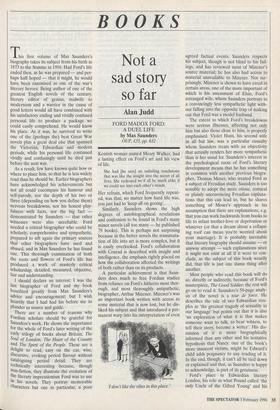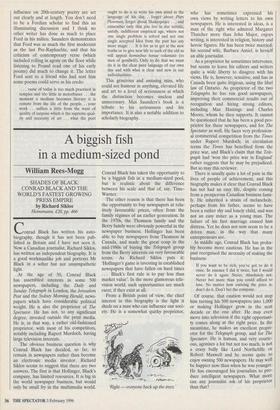BOOKS
Not a sad story so far
Alan Judd
FORD MADOX FORD: A DUEL LIFE by Max Saunders OUP, £35, pp. 632 his first volume of Max Saunders's biography takes its subject from his birth in 1873 to the Somme in 1916. Had Ford's life ended then, as he was prepared — and per- haps half hoped — that it might, he would have been canonised as one of the war's literary heroes. Being author of one of the greatest English novels of the century, literary editor of genius, midwife to modernism and a warrior in the cause of good letters would all have combined with his satisfactory ending and vividly confused personal life to produce a package we could easily comprehend. He would know his place. As it was, he survived to write one of the (perhaps the) best Great War novels plus a great deal else that spanned the Victorian, Edwardian and modern periods, while his personal life continued vividly and confusingly until he died just before the next war.
As a result, few have known quite how or where to place him, so that he is less widely read than he should be. Earlier biographers have acknowledged his achievements but not all could encompass his humour and self-parody, nor the depth of his two or three (depending on how you define them) nervous breakdowns, nor his honest play- fulness with facts, nor the big fact demonstrated by Saunders — that other witnesses were also unreliable. Ford needed a critical biographer who could be scholarly, comprehensive and sympathetic, prepared to sift again the primary sources that other biographers have used and abused, and in Max Saunders he has found one. This thorough examination of both the roots and flowers of Ford's life has Produced a work of masterly critical scholarship, detailed, measured, objective, fair and understanding.
I should declare an interest: I was the last biographer of Ford and my book benefited greatly from Max Saunders's advice and encouragement; but I wish heartily that I had had his before me to plunder as source and guide.
There are a number of reasons why Fordian scholars should be grateful for Saunders's work. He shows the importance for the whole of Ford's later writing of the early trilogy of books about Britain, The Soul of London, The Heart of the Country and The Spirit of the People. These are a delight to read, easy on the ear, wise, discursive, evoking period flavour without cataloguing period detail. They are technically interesting because, though non-fiction, they illustrate the evolution of the literary impressionism Ford was to use in his novels. They portray memorable characters but one in particular, a poor Kentish woman named Meary Walker, had a lasting effect on Ford's art and his view of life.
She had [he says] an unfailing touchstone that was like the insight into the secret of all lives. She reckoned we'd all be much alike if we could see into each other's minds.
Her refrain, which Ford frequently repeat- ed, was that, no matter how hard life was, you just had to 'keep all on gooing'.
Similarly, Saunders shows the high degrees of autobiographical revelations and confession to be found in Ford's many minor novels (all too many — he published 79 books). This is perhaps not surprising because in the better novels the transmuta- tion of life into art is more complex, but it is easily overlooked. Ford's collaboration with Conrad is described with insight and intelligence, the emphasis rightly placed on how the collaboration affected the writings of both rather than on its products.
A particular achievement is that Saun- ders does much to free Fordian studies from reliance on Ford's hitherto most thor- ough, and most thoroughly antipathetic, biographer, Arthur Mizener. Mizener's was an important book written with access to some material that is now lost, but he dis- liked his subject and that introduced a per- manent warp into his interpretation of even `I don't like the vibes in this place.' agreed factual events. Saunders respects his subject, though is not blind to his fail- ings, and has reviewed most of Mizener's source material; he has also had access to material unavailable to Mizener. Not sur- prisingly, Mizener is shown to have erred in certain areas, one of the more important of which is his assessment of Elsie, Ford's estranged wife, whom Saunders portrays in a convincingly less sympathetic light with- out falling into the opposite trap of making out that Ford was a model husband.
The extent to which Ford's breakdowns were serious illnesses, affecting not only him but also those close to him, is properly emphasised. Violet Hunt, his second wife in all but law, was a particular casualty whom Saunders treats with an objectivity that actually renders her more sympathetic than is her usual lot. Saunders's interest in the psychological roots of Ford's literary development means that he has something in common with another previous biogra- pher, Thomas Moser, who treated Ford as a subject of Freudian study. Saunders is too sensible to adopt the more otiose, comical or plainly unconvincing Freudian explana- tions that this can lead to, but he shares something of Moser's approach in his assumption that there are explanations, e.g. that you can work backwards from books to life to infant mother-love or deprivation or whatever (or that a dream about a collaps- ing roof can mean you're worried about your marriage). It is probably inevitable that literary biography should assume — or anyway attempt — such explanations since it might not exist at all if it were to con- clude, as the subject of this book wearily did, that life is just one damn thing after another.
Most people who read this book will do so, directly or indirectly, because of Ford's masterpiece, The Good Soldier; the rest will go on to read it. Saunders's 58-page analy- sis of the novel is a tour de force. He describes the tale of two Edwardian cou- ples as 'the greatest tragedy of sexuality in our language' but points out that it is also `an exploration of what it is that makes someone want to talk, to bear witness, to tell their story, become a writer'. His dis- cussion of it is more biographically informed than any other and his tentative hypothesis that Nancy, one of the book's more innocent victims, might be Edward's child adds poignancy to any reading of it. In the end, though, it can't all be tied down or explained and that, as Saunders is happy to acknowledge, is part of its greatness.
Ford's place in Edwardian literary London, his role as what Pound called 'the only Uncle of the Gifted Young' and his influence on 20th-century poetry are set out clearly and at length. You don't need to be a Fordian scholar to find this an illuminating discussion and I think no other writer has done as much to place Ford in his milieu. Saunders demonstrates that Ford was as much the first modernist as the last Pre-Raphaelite, and that his criticism of contemporary verse (which included rolling in agony on the floor while listening to Pound read one of his early poems) did much to change it. The letter Ford sent to a friend who had sent him some poems could serve as his credo: . . . verse of today is too much practised in temples and hio little in motorbuses .. . the moment a medium becomes literary it is remote from the life of the people. .. your work . . . suffers a little from the want of quality of surprise which is the supreme qual- ity and necessity of art . .. what the poet ought to do is to write his own mind in the language of his day. . . forget about Piers Plowman, forget about Shakespeare . . . and remember only that you live in our terrific, untidy, indifferent empirical age, where not one single problem is solved and not one single accepted Idea from the past has any more magic . . . It is for us to get at the new truths or to give new life to such of the old as will appeal hominibus bonae voluntatis (to men of goodwill). Only to do that we must do it in the clear pure language of our own day and with what is clear and new in our individualities.
This generous and amusing man, who could see humour in anything, elevated life and art to a level of seriousness at which the distinction becomes unclear and unnecessary. Max Saunders's book is a tribute to his seriousness and his importance. It is also a notable addition to scholarly biography.



































































 Previous page
Previous page